Mystery Train (1989): the beauty of decadence | lo bello de la decadencia

Una de las películas más celebradas de Jim Jarmusch
It wasn't on purpose, but sometimes these things happen. When choosing a movie in the midst of a sea of options, we often let chance determine it or we let ourselves be carried away by some sensation that we cannot describe. Personally, I try to alternate my tastes: watch something modern, then a classic, first romance, then thriller and so on. But, by chance (?) the last three films that I have reviewed have been related to oriental characters and all three were released in the 1980s.
No fue a propósito, pero a veces suceden estas cosas. A la hora de escoger una película en medio de un mar de opciones, muchas veces dejamos que lo determine el azar o nos dejamos llevar por alguna sensación que no podemos describir. En lo personal intento alternar mis gustos: ver algo moderno, luego un clásico, primero romance, después thriller y así. Pero, por cosas del azar (?) las últimas tres películas que he reseñado han estado relacionadas con personajes orientales y las tres fueron estrenadas en la década de los años ochenta.
After having unearthed a cinematographic gem by Heiny Srour and having met again with Akira Kurosawa, two nights ago I had the opportunity to discover one of the most celebrated works of North American Jim Jarmusch. Mystery Train (whose main image of this post I had seen countless times) is a film that tells three stories that have an almost tangential relationship, but in which there are two points in common: they all take place in Memphis , Tennessee; and they are all starring foreigners. The first of the three stories is titled Far from Yokohama and in it we see Jun and Mitsuko, two young Japanese (no more than twenty years old) who have arrived in the city with a musical itinerary: their dream is to visit Graceland, the mythical home of the King of Rock 'n Roll, Elvis Presley, and Sun Studios, a place no less iconic because artists such as Muddy Waters, B.B. King, Rufus Thomas, Johnny Cash, Carl Perkins, Roy Orbison, Jerry Lee Lewis recorded there and also Elvis himself. With a suitcase for both of them, the young Japanese get off the train and begin to walk the streets of Memphis. At first, the city seems to Jun to be like a less populated Yokohama. Not Mitsuko, although she doesn't care because all she wants is to go to Graceland. Their trip is a kind of musical pilgrimage under the guiding star of Elvis Presley, a musician who Jun doesn't think is as good as Carl Perkins (however, the young Japanese man's way of dressing and hair style are very Elvis).
Después de haber desenterrado una joya cinematográfica de Heiny Srour y de haberme reencontrado con Akira Kurosawa, hace dos noches me llegó la oportunidad de descubrir una de las obras más celebradas del norteameticano Jim Jarmusch. Mystery Train (cuya imagen principal de este post la había visto infinidad de veces) es una película que cuenta tres historias que guardan una relación casi tangencial, pero en la que hay dos puntos en común: todas ocurren en Memphis, Tennessee; y todas son protagonizadas por extranjeros. La primera de las tres historias se titula Far from Yokohama y en ella vemos a Jun y Mitsuko, dos jóvenes japoneses (de no más de veinte años) que han llegado a la ciudad con un itinerario musical: su sueño es visitar Graceland, la mítica casa del Rey del Rock 'n Roll, Elvis Presley, y los Sun Studios, un lugar no menos icónico porque allí grabaron artistas como o Muddy Waters, B.B. King, Rufus Thomas, Johnny Cash, Carl Perkins, Roy Orbison, Jerry Lee Lewis y también el mismísimo Elvis. Con una maleta para ambos, los jóvenes japoneses se bajan del tren y comienzan a caminar las calles de Memphis. Al principio, a Jun la ciudad se le parece a una menos poblada Yokohama. A Mitsuko no, aunque a ella no le importa porque lo único que quiere es ir a Graceland. Su viaje es una especie de peregrinación musical bajo la estrella guía de Elvis Presley, músico que a Jun no le parece tan bueno como Carl Perkins (sin embargo, la forma de vestir y de peinarse del joven japonés son muy a lo Elvis).
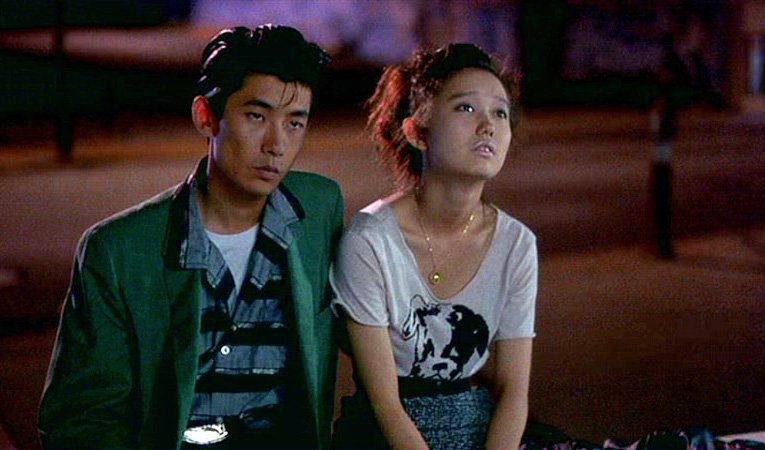
That first part is a kind of a love story between young people, with some musical drama and urban history. Since most of the time they are alone and speak Japanese, one might think - if you don't know the truth - that the film is Asian, but the script was written by Jarmusch himself. Unable to visit both points on their agenda on the same day, the rock tourists must spend a night in Memphis and chance (destiny?) leads them to stay in a modest - to use a benevolent term - hotel, where the protagonists of the other two stories will also stay during the same night.
Esa primera parte es una especie de historia de amor entre los jóvenes, con algo de drama musical y de historia urbana. Como la mayoría del tiempo están solos y hablan japonés, uno podría pensar - si no sabe la verdad - que la película es asiática, pero el guión fue escrito por el mismo Jarmusch. Al no poder visitar ambos puntos de su agenda el mismo día, los turistas del rock deben pasar una noche en Memphis y el azar (¿el destino?) los lleva a alojarse en un modesto - por usar un término benevolente - hotel, en donde también se hospedarán, durante la misma noche, los protagonistas de las otras dos historias.
As Luisa (played by Nicoletta Braschi, the principessa of La Vita è bella by Roberto Benigni), an Italian woman who, in A Ghost, suffers a setback when trying to return to her native Italy accompanied by the corpse of her husband (who is in a coffin). After walking through the streets of Memphis and receiving a good dose of American consumerism, Luisa goes to the dilapidated hotel that appeared in the first part and there she will share a room with Dee Dee, a girl who has just broken up with her boyfriend Charlie and that the next day will leave for Natchez, Mississippi. This second story has a touch of fantasy, some goodness and a bit of suspense as well, but like the first it is not as fun as the end of the triptych, Lost in Space, where the named Charlie appears, who along with two Friends find themselves involved in a shady situation and go to the hotel in a state of intoxication to hide during the night and mislead the police. It's true that this part is the most violent of the film and that perhaps it's not as endearing as the young Japanese couple who love rock, but the presence and performance of Steve Buscemi as Charlie's brother-in-law (and Dee Dee's brother) brings great moments of comedy to the story and the film.
Como Luisa (intepretada por Nicoletta Braschi, la principessa de La Vita è bella de Roberto Benigni), una mujer italiana que, en A Ghost, sufre un contratiempo al intentar volver a su italia natal acompañada del cadáver de su marido (que va en un ataúd). Después de caminar por las calles de Memphis y de recibir una buena dosis de consumismo norteamericano, Luisa va a dar al maltrecho hotel que apareció en la primera parte y allí compartirá habitación con Dee Dee, una chica que acaba de terminar con su novio Charlie y que al día siguiente se marchará a Natchez, Mississippi. Esta segunda historia tiene un toque de fantasía, algo de bondad y un poco de suspenso también, pero al igual que la primera no resulta tan divertida como el final del tríptico, Lost in Space, en donde aparece el nombrado Charlie, quien junto a dos amigos se ven envueltos en una situación turbia y acuden al hotel en estado de embriaguez para esconderse durante la noche y despistar a la policía. Es cierto que esta parte es la más violenta de la película y que quizás no resulta tan entrañable como la pareja de jóvenes japoneses amantes del rock, pero la presencia y la interpretación de Steve Buscemi como el barbero cuñado de Charlie (y hermano de Dee Dee) le aporta grandes momentos de comicidad a la historia y a la película.
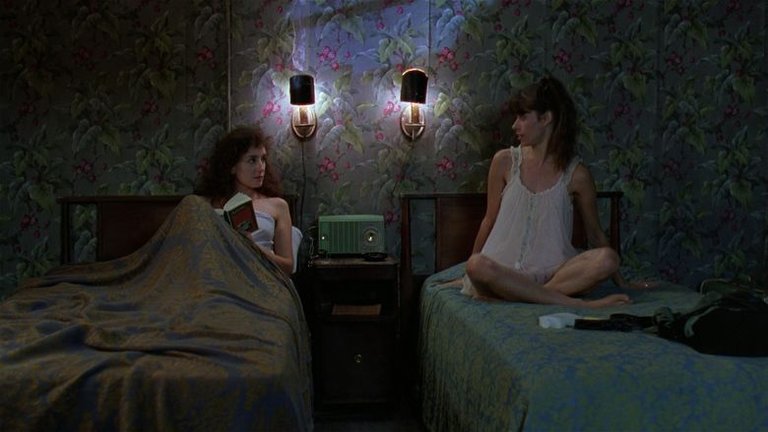
But, in addition to the aforementioned characters, the protagonist of the film is the city of Memphis, birthplace of Elvis Presley. Mystery Train is not a poem about a city like the one Woody Allen does in Midnight in Paris, or Scorsese in New York, New York. It is more of a love letter to a lost lover, written on a stained and somewhat wrinkled napkin, with beautiful words, yes, because the portrayal of Memphis in the film leaves a lot to be desired: the settings shown are dirty, there are abandoned buildings, dark alleys, ruined rooms... and yet, in all this urban harshness, there is also beauty.
Pero, además de los personajes mencionados, la protagonista de la película es la ciudad de Memphis, cuna de Elvis Presley. Mystery Train no es un poema a una ciudad como el que hacen Woody Allen en Midnight in Paris, o Scorsese en New York, New York. Es más bien una carta de amor para una amante perdida, escrita en una servilleta manchada y algo arrugada, con palabras hermosas, eso sí, porque el retrato de Memphis en la película deja mucho que desear: los escenarios que se muestran están sucios, hay edificios abandonados, callejones oscuros, habitaciones en ruinas... y sin embargo, en toda esta crudeza urbana, hay también belleza.
And I think that's the key to the success of this film. Not a success at the box office (in fact it made a loss) but in the recognition of the public and critics who have turned it into a cult film in American independent cinema. There are very interesting issues, such as the cultural globalization that encourages the trip of two young Japanese to the territory of the country that destroyed theirs just four decades ago; or the way in which Europe sees the US as a consumerist, profiteering and money-devoting nation; or the decadence in which thousands of people live who come to that country in search of the American dream, but who only manage to wake up to a reality that is not as attractive or as friendly as it is seen in the travel guides. And yet, those desolate landscapes and that dilapidated hotel captivate the viewer with the charm of the stories and the honesty of its characters. In Mystery Train, Memphis seems like a horrible city, but it makes you want to take that train and walk its streets, stay in that hotel and walk through its early mornings full of danger and violence. Mystery Train is a stark, honest tribute, without satire, to a city and a mythologized country; It's a love letter that smells of desolation, humidity, whiskey and cigarette smoke... but it's still a love letter, have any of you seen this movie? I read you in the comments.
Y creo que esa es la clave del éxito de esta película. No un éxito en la taquilla (de hecho dio pérdidas) sino en el reconocimiento del público y de los críticos que la han convertido en una película de culto del cine independiente norteamericano. Hay cuestiones muy interesantes, como la globalización cultural que propicia el viaje de dos jóvenes japoneses al territorio del país que destruyó el suyo apenas cuatro décadas atrás; o la forma en que Europa ve a los EEUU como una nación consumista, aprovechadora y devota del dinero; o la decadencia en que viven miles de personas que llegan a ese país en busca del sueño americano, pero que sólo consiguen despertar a una realidad que no es tan vistosa ni tan amable como se ve en las guías de viaje. Y sin embargo, esos paisajes desolados y ese hotel ruinoso cautivan al espectador por el encanto de las historias y la honestidad de sus personajes. En Mystery Train, Memphis parece una ciudad horrible, pero a uno le dan ganas de tomar ese tren y recorrer sus calles, hospedarse en ese hotel y caminar por sus madrugadas llenas de peligro y violencia. Mystery Train es un homenaje descarnado, honesto, sin sátira, a una ciudad y a un país mitificado; es una carta de amor que huele a desolación, a humedad, a whisky y a humo de cigarrillo... pero sigue siendo una carta de amor, ¿alguno de ustedes ha visto esta película? Los leo en los comentarios.
Reseñado por @cristiancaicedo
Other posts that may interest you | Otros posts que pueden interesarte:
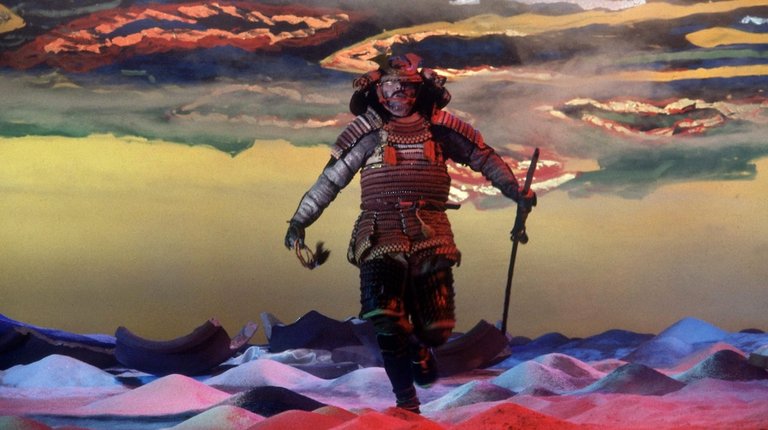  |
|---|
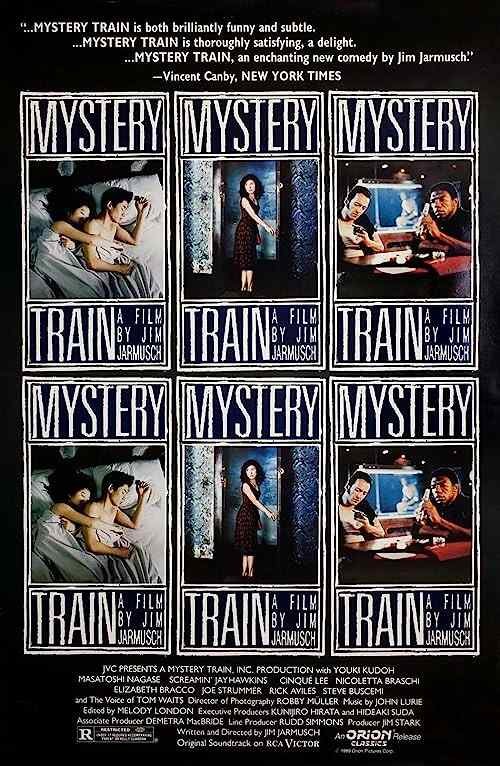


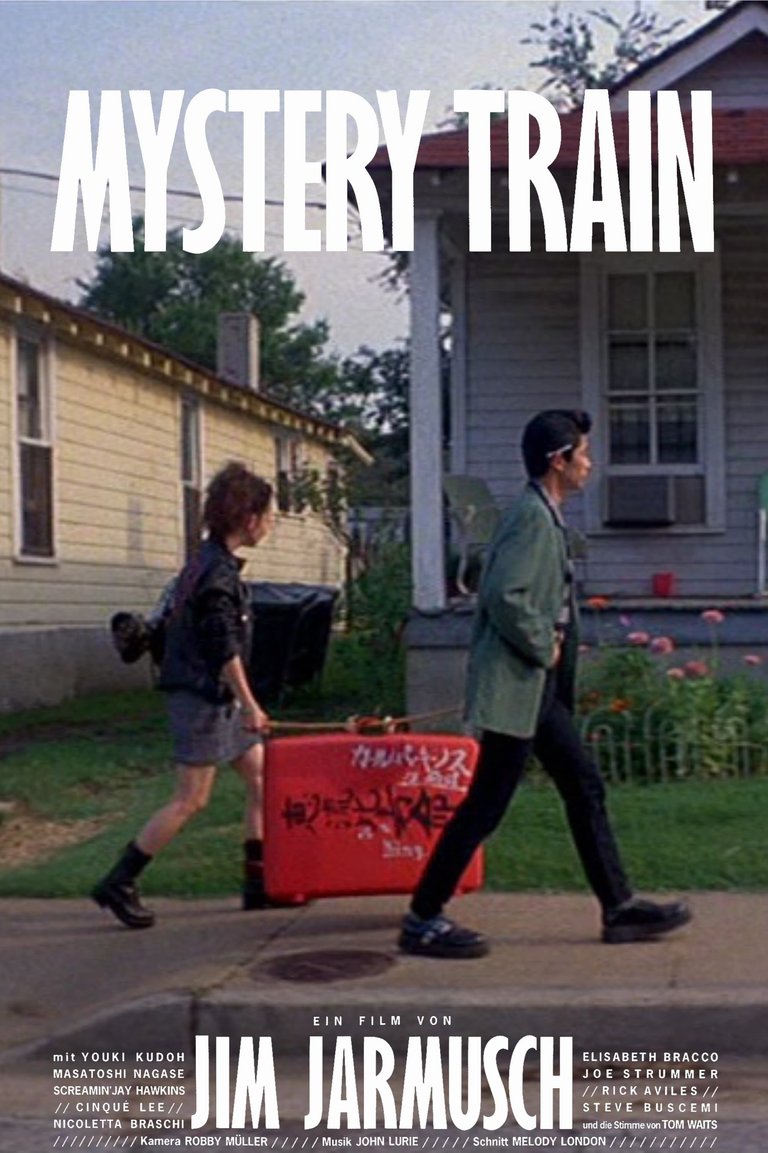
Keep up the good work. 👏
Recognized by Mystic artist Gudasol
You are loved.
Interested to to help music map cXc.world spread more good vibes on Hive?.